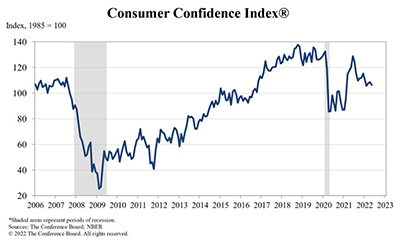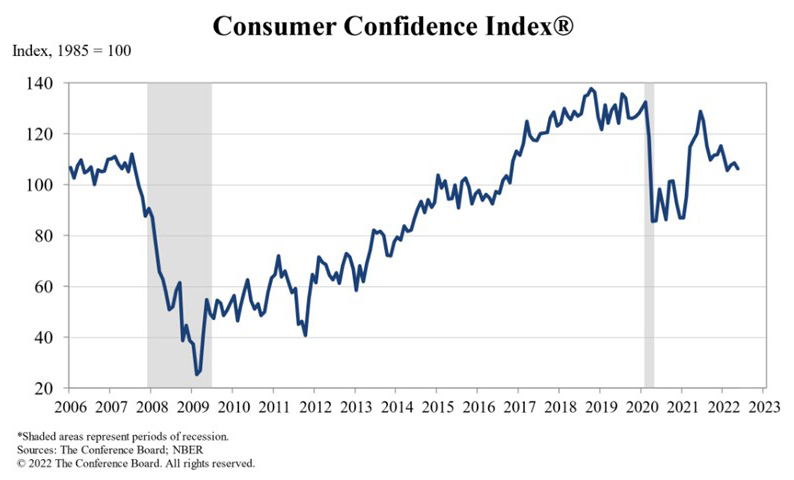
Inflation, Rising Interest Rates Cool Consumer Confidence

The Conference Board, New York, said its Consumer Confidence Index decreased slightly in May, following a small increase in April.
The Index now stands at 106.4, down from 108.6 in April (after an upward revision). The Present Situation Index—based on consumers’ assessment of current business and labor market conditions—declined to 149.6 from 152.9 last month. The Expectations Index—based on consumers’ short-term outlook for income, business and labor market conditions—declined to 77.5 from 79.0.

“The decline in the Present Situation Index was driven solely by a perceived softening in labor market conditions,” said Lynn Franco, Senior Director of Economic Indicators at The Conference Board. “By contrast, views of current business conditions—which tend to move ahead of trends in jobs—improved. Overall, the Present Situation Index remains at strong levels, suggesting growth did not contract further in Q2. That said, with the Expectations Index weakening further, consumers also do not foresee the economy picking up steam in the months ahead. They do expect labor market conditions to remain relatively strong, which should continue to support confidence in the short run.”
Franco noted purchasing intentions for cars, homes, major appliances and more all cooled—likely a reflection of rising interest rates and consumers pivoting from big-ticket items to spending on services. “Vacation plans have also softened due to rising prices,” she said. “Indeed, inflation remains top of mind for consumers, with their inflation expectations in May virtually unchanged from April’s elevated levels. Looking ahead, expect surging prices and additional interest rate hikes to pose continued downside risks to consumer spending this year.”
“High frequency data show consumer activity picking up, which is consistent with last week’s decent personal spending data,” said Tim Quinlan, Senior Economist with Wells Fargo Economics, Charlotte, N.C. “Financial markets in recent weeks have been preoccupied with whether the Federal Reserve’s plan to raise rates will derail the economy. To that end, every piece of data becomes a new brick to build upon this wall of worry. The psyche of the consumer has been moving in the wrong direction, on trend, for the better part of the past year. The separately reported consumer-sentiment index from University of Michigan dropped in May to a decade low amid ongoing worries about inflation. The comparatively smaller decline in the Conference Board’s measure of consumer sentiment has to do with the strength of the labor market, something that plays a larger role in this survey.”
Other key report findings:
–Consumers’ appraisal of current business conditions improved in May; 21.1% of consumers said business conditions were “good,” up from 20.8%; 20.7% of consumers said business conditions were “bad,” down from 22.2%.
–Consumers’ assessment of the labor market was less positive; 51.8% of consumers said jobs were “plentiful,” down from 54.8%; 12.5% of consumers said jobs are “hard to get,” up from 10.1%.
–Consumers’ pessimism about the short-term business conditions outlook grew in May; 17.7% of consumers expect business conditions will improve, down from 18.6%; 24.9% expect business conditions to worsen, up from 21.7%.
–Consumers were somewhat less pessimistic about the short-term labor market outlook; 18.5% of consumers expect more jobs to be available, virtually unchanged from 18.4%; 18.7% anticipate fewer jobs, down from 19.8%.
–Consumers were mixed about their short-term financial prospects; 19.0% of consumers expect their incomes to increase, up from 17.8%; conversely, 14.5% expect their incomes will decrease, up from 13.2%.
